Financial Planning: Regulations, Ethics, and Educational Impact
VerifiedAdded on 2023/01/13
|14
|3511
|31
Report
AI Summary
This report provides a comprehensive overview of the financial planning industry, examining the significant reforms and ethical standards that shape its landscape. It begins with an introduction to the financial planning sector, highlighting its importance and the need for robust regulations. The discussion delves into the impact of financial regulations, particularly the Corporation Amendment Act 2017, which aims to enhance the professional, educational, and ethical standards of financial advisors. The report details the establishment of an independent standards body, outlining its functions in regulating qualifications, conducting exams, and formulating ethical codes. It explores the new education and supervision requirements, including degree qualifications and compulsory exams, as well as ongoing professional development. Furthermore, the report addresses the influence of ethical standards, the role of the Australian government in setting up Future of Financial Advice (FOFA) reforms, and factors affecting financial advisors, such as overconfidence and lack of competency. The report concludes by emphasizing the importance of ethical conduct and the need for financial advisors to possess appropriate judgment and knowledge to provide effective financial advice, adhering to the ethical codes established by the Financial Adviser Standards and Ethics Authority (FASEA).

Running head: FINANCIAL PLANNING
Financial Planning
Name of the Student:
Name of the University:
Author’s Note
Financial Planning
Name of the Student:
Name of the University:
Author’s Note
Paraphrase This Document
Need a fresh take? Get an instant paraphrase of this document with our AI Paraphraser
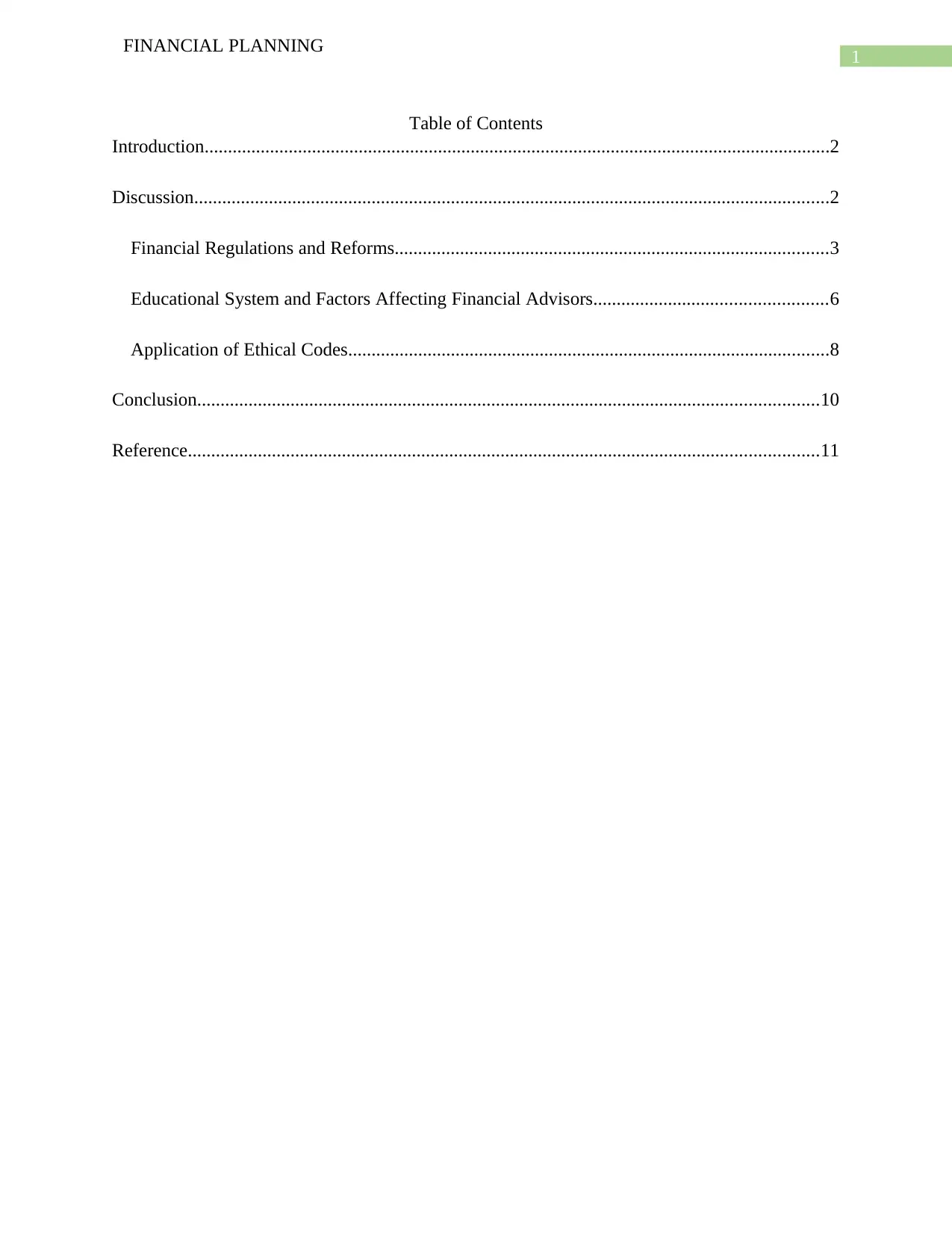
1
FINANCIAL PLANNING
Table of Contents
Introduction......................................................................................................................................2
Discussion........................................................................................................................................2
Financial Regulations and Reforms.............................................................................................3
Educational System and Factors Affecting Financial Advisors..................................................6
Application of Ethical Codes.......................................................................................................8
Conclusion.....................................................................................................................................10
Reference.......................................................................................................................................11
FINANCIAL PLANNING
Table of Contents
Introduction......................................................................................................................................2
Discussion........................................................................................................................................2
Financial Regulations and Reforms.............................................................................................3
Educational System and Factors Affecting Financial Advisors..................................................6
Application of Ethical Codes.......................................................................................................8
Conclusion.....................................................................................................................................10
Reference.......................................................................................................................................11
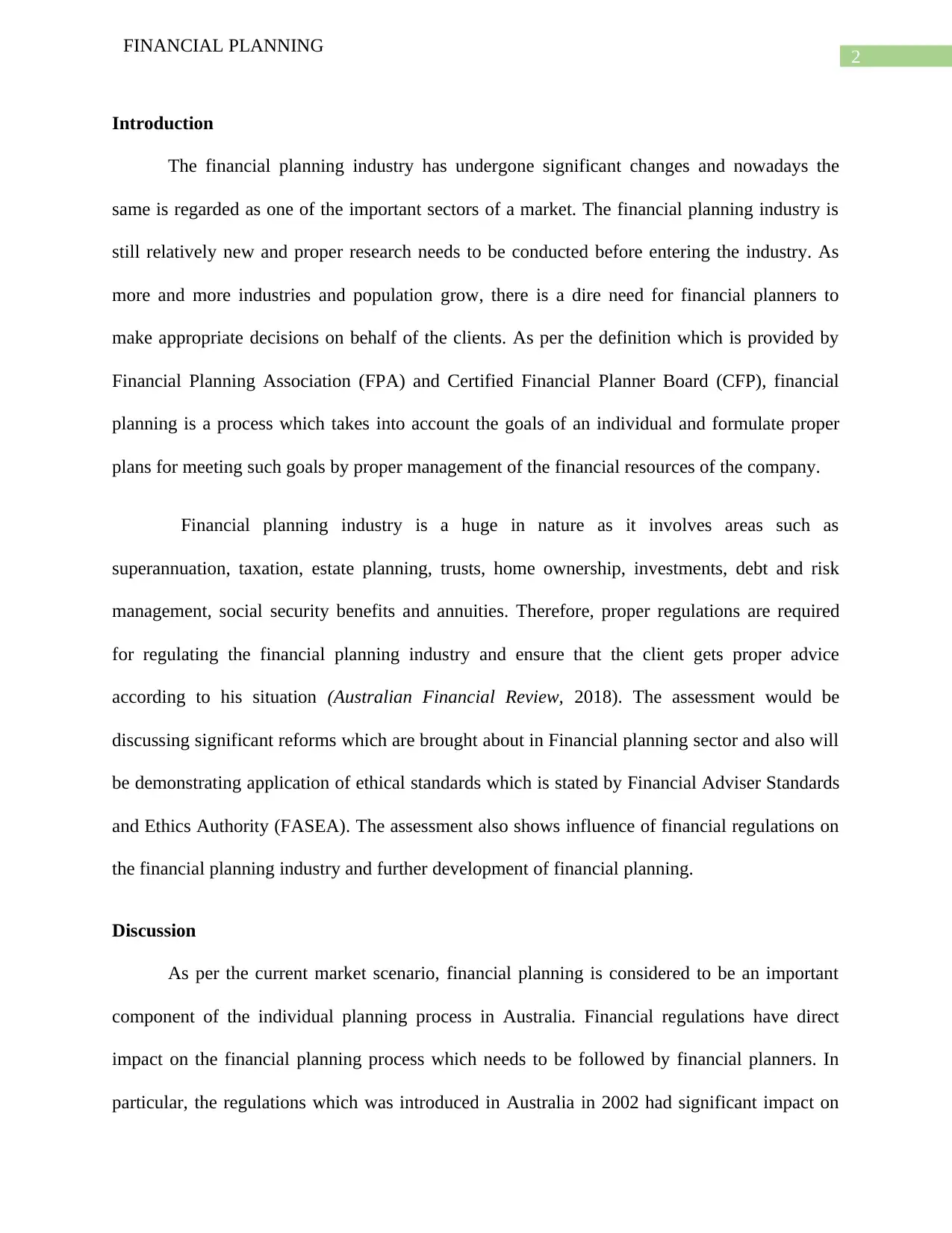
2
FINANCIAL PLANNING
Introduction
The financial planning industry has undergone significant changes and nowadays the
same is regarded as one of the important sectors of a market. The financial planning industry is
still relatively new and proper research needs to be conducted before entering the industry. As
more and more industries and population grow, there is a dire need for financial planners to
make appropriate decisions on behalf of the clients. As per the definition which is provided by
Financial Planning Association (FPA) and Certified Financial Planner Board (CFP), financial
planning is a process which takes into account the goals of an individual and formulate proper
plans for meeting such goals by proper management of the financial resources of the company.
Financial planning industry is a huge in nature as it involves areas such as
superannuation, taxation, estate planning, trusts, home ownership, investments, debt and risk
management, social security benefits and annuities. Therefore, proper regulations are required
for regulating the financial planning industry and ensure that the client gets proper advice
according to his situation (Australian Financial Review, 2018). The assessment would be
discussing significant reforms which are brought about in Financial planning sector and also will
be demonstrating application of ethical standards which is stated by Financial Adviser Standards
and Ethics Authority (FASEA). The assessment also shows influence of financial regulations on
the financial planning industry and further development of financial planning.
Discussion
As per the current market scenario, financial planning is considered to be an important
component of the individual planning process in Australia. Financial regulations have direct
impact on the financial planning process which needs to be followed by financial planners. In
particular, the regulations which was introduced in Australia in 2002 had significant impact on
FINANCIAL PLANNING
Introduction
The financial planning industry has undergone significant changes and nowadays the
same is regarded as one of the important sectors of a market. The financial planning industry is
still relatively new and proper research needs to be conducted before entering the industry. As
more and more industries and population grow, there is a dire need for financial planners to
make appropriate decisions on behalf of the clients. As per the definition which is provided by
Financial Planning Association (FPA) and Certified Financial Planner Board (CFP), financial
planning is a process which takes into account the goals of an individual and formulate proper
plans for meeting such goals by proper management of the financial resources of the company.
Financial planning industry is a huge in nature as it involves areas such as
superannuation, taxation, estate planning, trusts, home ownership, investments, debt and risk
management, social security benefits and annuities. Therefore, proper regulations are required
for regulating the financial planning industry and ensure that the client gets proper advice
according to his situation (Australian Financial Review, 2018). The assessment would be
discussing significant reforms which are brought about in Financial planning sector and also will
be demonstrating application of ethical standards which is stated by Financial Adviser Standards
and Ethics Authority (FASEA). The assessment also shows influence of financial regulations on
the financial planning industry and further development of financial planning.
Discussion
As per the current market scenario, financial planning is considered to be an important
component of the individual planning process in Australia. Financial regulations have direct
impact on the financial planning process which needs to be followed by financial planners. In
particular, the regulations which was introduced in Australia in 2002 had significant impact on
⊘ This is a preview!⊘
Do you want full access?
Subscribe today to unlock all pages.

Trusted by 1+ million students worldwide
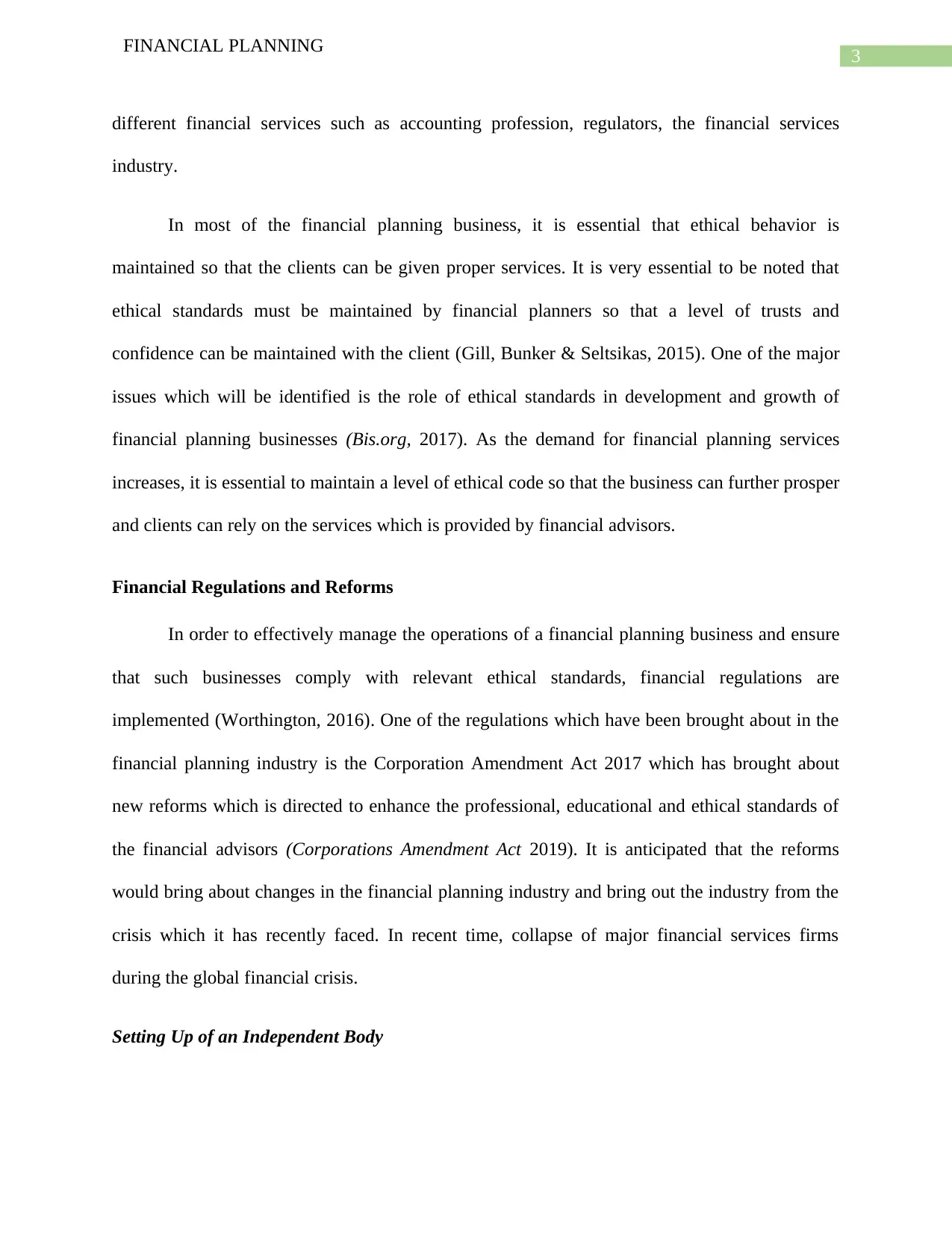
3
FINANCIAL PLANNING
different financial services such as accounting profession, regulators, the financial services
industry.
In most of the financial planning business, it is essential that ethical behavior is
maintained so that the clients can be given proper services. It is very essential to be noted that
ethical standards must be maintained by financial planners so that a level of trusts and
confidence can be maintained with the client (Gill, Bunker & Seltsikas, 2015). One of the major
issues which will be identified is the role of ethical standards in development and growth of
financial planning businesses (Bis.org, 2017). As the demand for financial planning services
increases, it is essential to maintain a level of ethical code so that the business can further prosper
and clients can rely on the services which is provided by financial advisors.
Financial Regulations and Reforms
In order to effectively manage the operations of a financial planning business and ensure
that such businesses comply with relevant ethical standards, financial regulations are
implemented (Worthington, 2016). One of the regulations which have been brought about in the
financial planning industry is the Corporation Amendment Act 2017 which has brought about
new reforms which is directed to enhance the professional, educational and ethical standards of
the financial advisors (Corporations Amendment Act 2019). It is anticipated that the reforms
would bring about changes in the financial planning industry and bring out the industry from the
crisis which it has recently faced. In recent time, collapse of major financial services firms
during the global financial crisis.
Setting Up of an Independent Body
FINANCIAL PLANNING
different financial services such as accounting profession, regulators, the financial services
industry.
In most of the financial planning business, it is essential that ethical behavior is
maintained so that the clients can be given proper services. It is very essential to be noted that
ethical standards must be maintained by financial planners so that a level of trusts and
confidence can be maintained with the client (Gill, Bunker & Seltsikas, 2015). One of the major
issues which will be identified is the role of ethical standards in development and growth of
financial planning businesses (Bis.org, 2017). As the demand for financial planning services
increases, it is essential to maintain a level of ethical code so that the business can further prosper
and clients can rely on the services which is provided by financial advisors.
Financial Regulations and Reforms
In order to effectively manage the operations of a financial planning business and ensure
that such businesses comply with relevant ethical standards, financial regulations are
implemented (Worthington, 2016). One of the regulations which have been brought about in the
financial planning industry is the Corporation Amendment Act 2017 which has brought about
new reforms which is directed to enhance the professional, educational and ethical standards of
the financial advisors (Corporations Amendment Act 2019). It is anticipated that the reforms
would bring about changes in the financial planning industry and bring out the industry from the
crisis which it has recently faced. In recent time, collapse of major financial services firms
during the global financial crisis.
Setting Up of an Independent Body
Paraphrase This Document
Need a fresh take? Get an instant paraphrase of this document with our AI Paraphraser
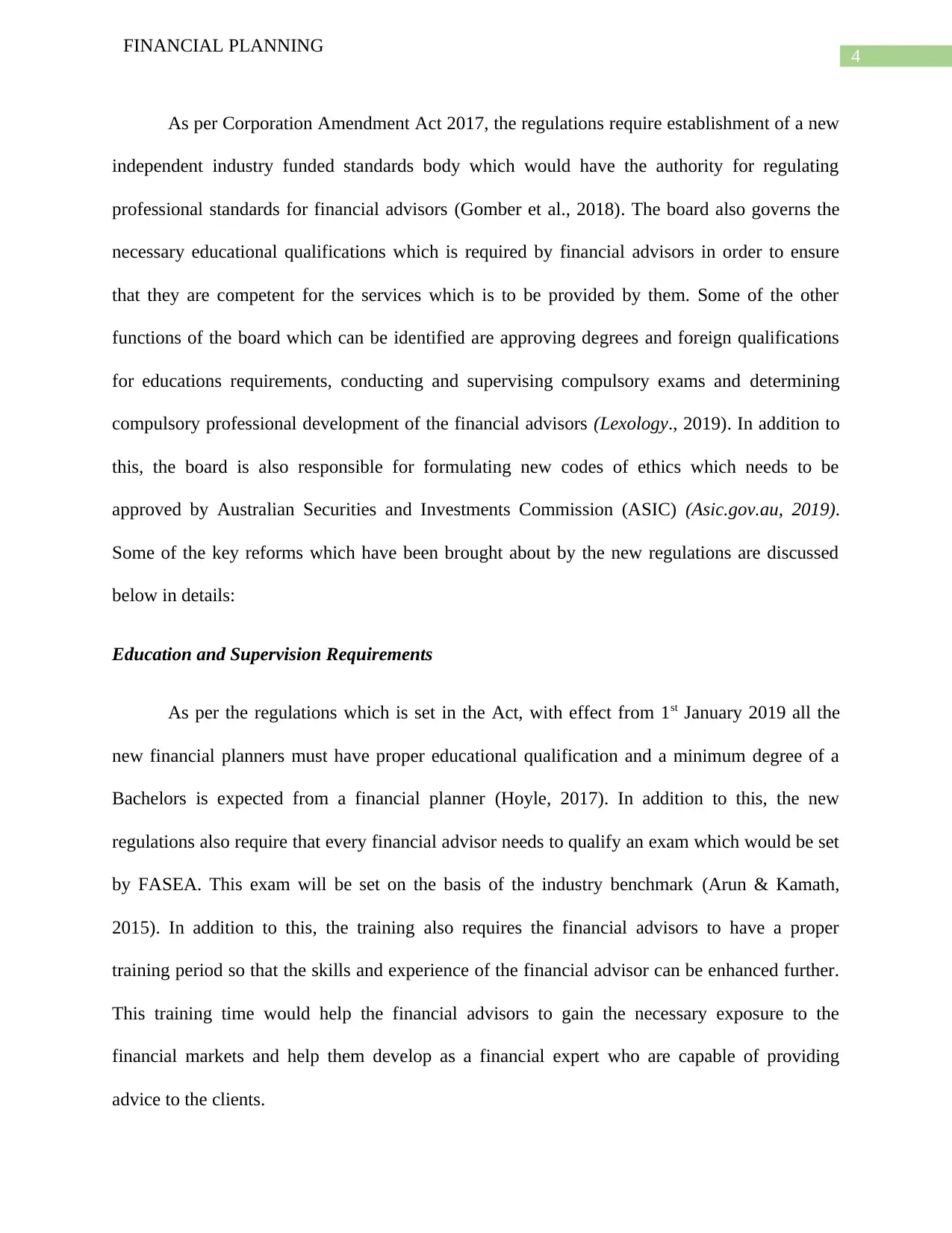
4
FINANCIAL PLANNING
As per Corporation Amendment Act 2017, the regulations require establishment of a new
independent industry funded standards body which would have the authority for regulating
professional standards for financial advisors (Gomber et al., 2018). The board also governs the
necessary educational qualifications which is required by financial advisors in order to ensure
that they are competent for the services which is to be provided by them. Some of the other
functions of the board which can be identified are approving degrees and foreign qualifications
for educations requirements, conducting and supervising compulsory exams and determining
compulsory professional development of the financial advisors (Lexology., 2019). In addition to
this, the board is also responsible for formulating new codes of ethics which needs to be
approved by Australian Securities and Investments Commission (ASIC) (Asic.gov.au, 2019).
Some of the key reforms which have been brought about by the new regulations are discussed
below in details:
Education and Supervision Requirements
As per the regulations which is set in the Act, with effect from 1st January 2019 all the
new financial planners must have proper educational qualification and a minimum degree of a
Bachelors is expected from a financial planner (Hoyle, 2017). In addition to this, the new
regulations also require that every financial advisor needs to qualify an exam which would be set
by FASEA. This exam will be set on the basis of the industry benchmark (Arun & Kamath,
2015). In addition to this, the training also requires the financial advisors to have a proper
training period so that the skills and experience of the financial advisor can be enhanced further.
This training time would help the financial advisors to gain the necessary exposure to the
financial markets and help them develop as a financial expert who are capable of providing
advice to the clients.
FINANCIAL PLANNING
As per Corporation Amendment Act 2017, the regulations require establishment of a new
independent industry funded standards body which would have the authority for regulating
professional standards for financial advisors (Gomber et al., 2018). The board also governs the
necessary educational qualifications which is required by financial advisors in order to ensure
that they are competent for the services which is to be provided by them. Some of the other
functions of the board which can be identified are approving degrees and foreign qualifications
for educations requirements, conducting and supervising compulsory exams and determining
compulsory professional development of the financial advisors (Lexology., 2019). In addition to
this, the board is also responsible for formulating new codes of ethics which needs to be
approved by Australian Securities and Investments Commission (ASIC) (Asic.gov.au, 2019).
Some of the key reforms which have been brought about by the new regulations are discussed
below in details:
Education and Supervision Requirements
As per the regulations which is set in the Act, with effect from 1st January 2019 all the
new financial planners must have proper educational qualification and a minimum degree of a
Bachelors is expected from a financial planner (Hoyle, 2017). In addition to this, the new
regulations also require that every financial advisor needs to qualify an exam which would be set
by FASEA. This exam will be set on the basis of the industry benchmark (Arun & Kamath,
2015). In addition to this, the training also requires the financial advisors to have a proper
training period so that the skills and experience of the financial advisor can be enhanced further.
This training time would help the financial advisors to gain the necessary exposure to the
financial markets and help them develop as a financial expert who are capable of providing
advice to the clients.
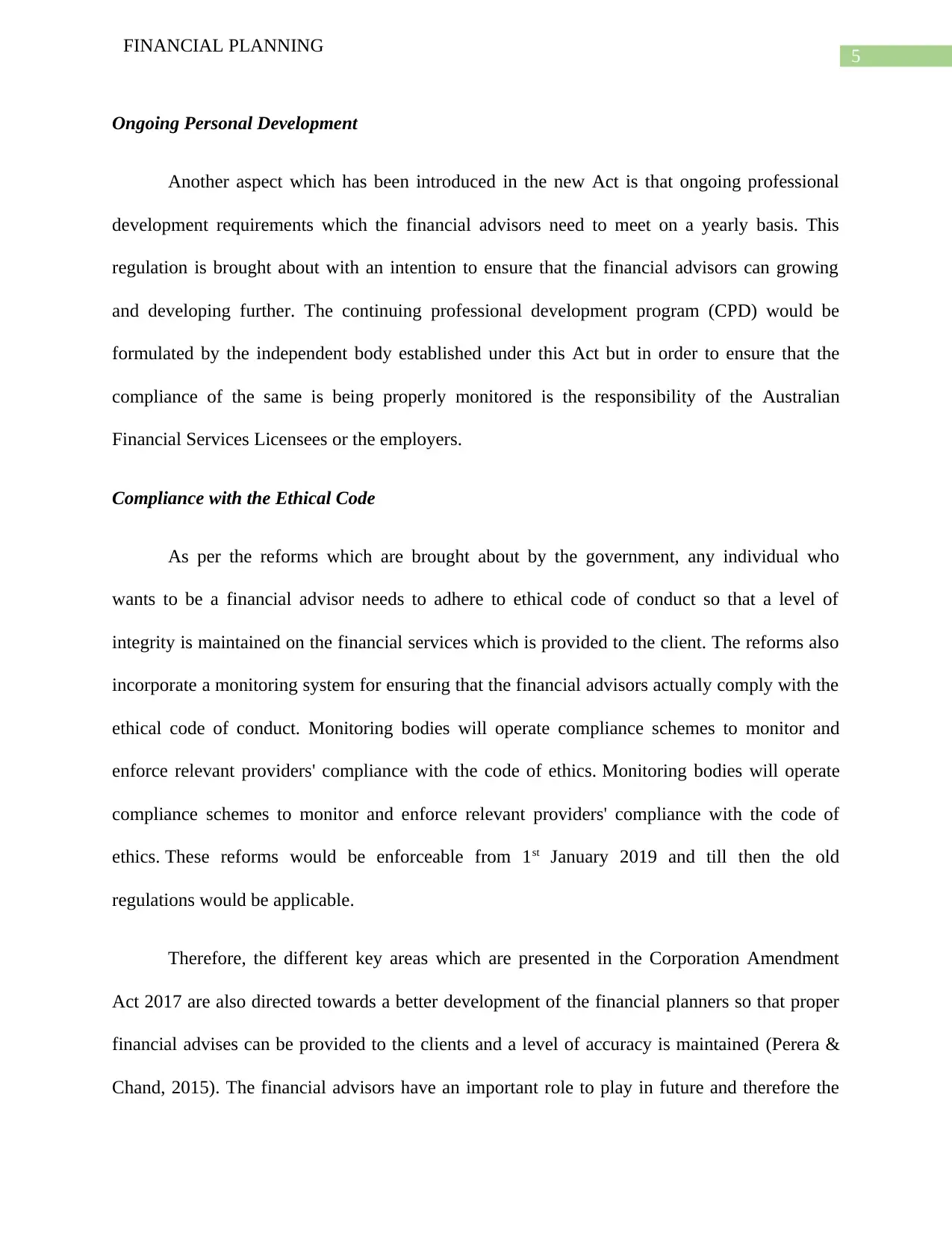
5
FINANCIAL PLANNING
Ongoing Personal Development
Another aspect which has been introduced in the new Act is that ongoing professional
development requirements which the financial advisors need to meet on a yearly basis. This
regulation is brought about with an intention to ensure that the financial advisors can growing
and developing further. The continuing professional development program (CPD) would be
formulated by the independent body established under this Act but in order to ensure that the
compliance of the same is being properly monitored is the responsibility of the Australian
Financial Services Licensees or the employers.
Compliance with the Ethical Code
As per the reforms which are brought about by the government, any individual who
wants to be a financial advisor needs to adhere to ethical code of conduct so that a level of
integrity is maintained on the financial services which is provided to the client. The reforms also
incorporate a monitoring system for ensuring that the financial advisors actually comply with the
ethical code of conduct. Monitoring bodies will operate compliance schemes to monitor and
enforce relevant providers' compliance with the code of ethics. Monitoring bodies will operate
compliance schemes to monitor and enforce relevant providers' compliance with the code of
ethics. These reforms would be enforceable from 1st January 2019 and till then the old
regulations would be applicable.
Therefore, the different key areas which are presented in the Corporation Amendment
Act 2017 are also directed towards a better development of the financial planners so that proper
financial advises can be provided to the clients and a level of accuracy is maintained (Perera &
Chand, 2015). The financial advisors have an important role to play in future and therefore the
FINANCIAL PLANNING
Ongoing Personal Development
Another aspect which has been introduced in the new Act is that ongoing professional
development requirements which the financial advisors need to meet on a yearly basis. This
regulation is brought about with an intention to ensure that the financial advisors can growing
and developing further. The continuing professional development program (CPD) would be
formulated by the independent body established under this Act but in order to ensure that the
compliance of the same is being properly monitored is the responsibility of the Australian
Financial Services Licensees or the employers.
Compliance with the Ethical Code
As per the reforms which are brought about by the government, any individual who
wants to be a financial advisor needs to adhere to ethical code of conduct so that a level of
integrity is maintained on the financial services which is provided to the client. The reforms also
incorporate a monitoring system for ensuring that the financial advisors actually comply with the
ethical code of conduct. Monitoring bodies will operate compliance schemes to monitor and
enforce relevant providers' compliance with the code of ethics. Monitoring bodies will operate
compliance schemes to monitor and enforce relevant providers' compliance with the code of
ethics. These reforms would be enforceable from 1st January 2019 and till then the old
regulations would be applicable.
Therefore, the different key areas which are presented in the Corporation Amendment
Act 2017 are also directed towards a better development of the financial planners so that proper
financial advises can be provided to the clients and a level of accuracy is maintained (Perera &
Chand, 2015). The financial advisors have an important role to play in future and therefore the
⊘ This is a preview!⊘
Do you want full access?
Subscribe today to unlock all pages.

Trusted by 1+ million students worldwide
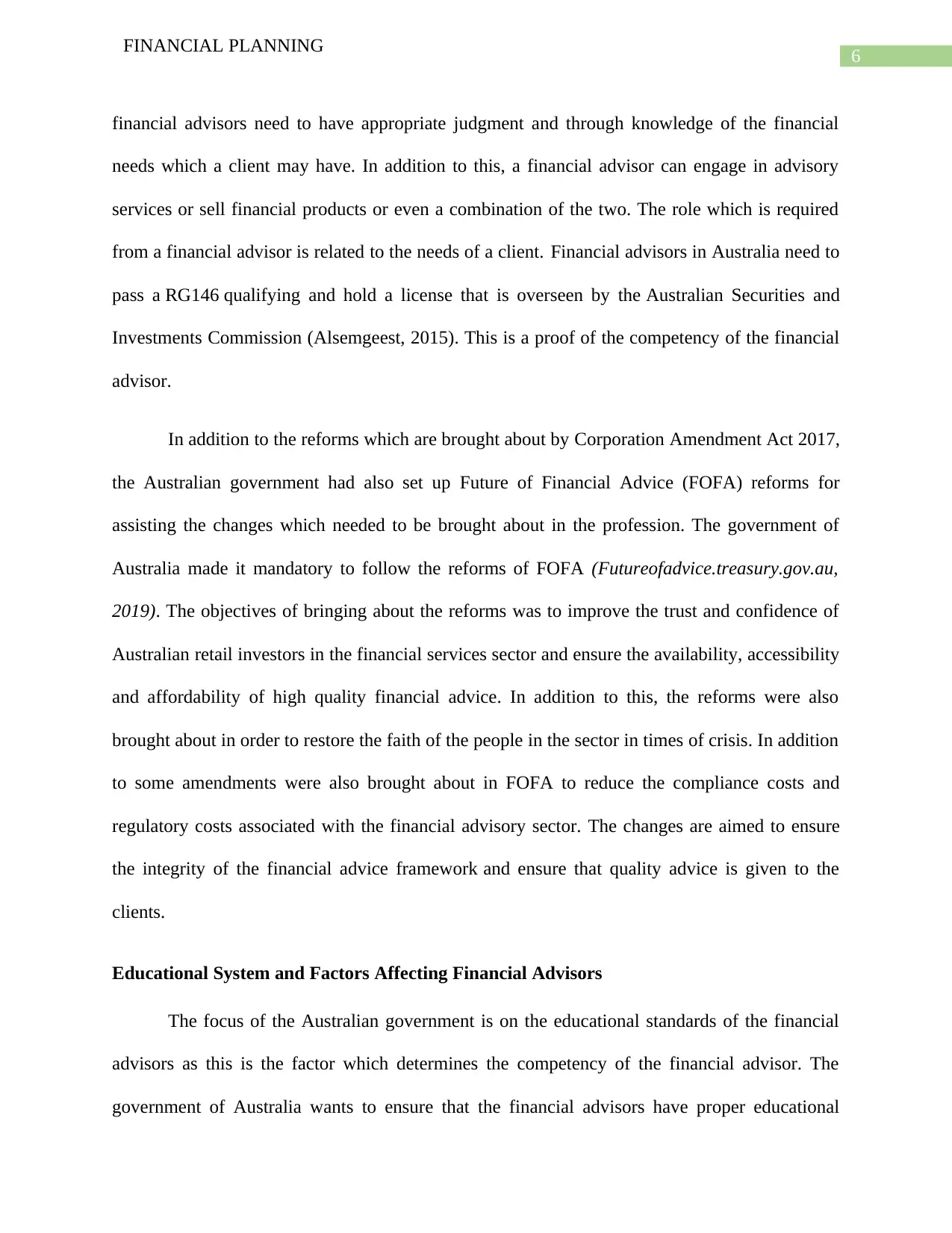
6
FINANCIAL PLANNING
financial advisors need to have appropriate judgment and through knowledge of the financial
needs which a client may have. In addition to this, a financial advisor can engage in advisory
services or sell financial products or even a combination of the two. The role which is required
from a financial advisor is related to the needs of a client. Financial advisors in Australia need to
pass a RG146 qualifying and hold a license that is overseen by the Australian Securities and
Investments Commission (Alsemgeest, 2015). This is a proof of the competency of the financial
advisor.
In addition to the reforms which are brought about by Corporation Amendment Act 2017,
the Australian government had also set up Future of Financial Advice (FOFA) reforms for
assisting the changes which needed to be brought about in the profession. The government of
Australia made it mandatory to follow the reforms of FOFA (Futureofadvice.treasury.gov.au,
2019). The objectives of bringing about the reforms was to improve the trust and confidence of
Australian retail investors in the financial services sector and ensure the availability, accessibility
and affordability of high quality financial advice. In addition to this, the reforms were also
brought about in order to restore the faith of the people in the sector in times of crisis. In addition
to some amendments were also brought about in FOFA to reduce the compliance costs and
regulatory costs associated with the financial advisory sector. The changes are aimed to ensure
the integrity of the financial advice framework and ensure that quality advice is given to the
clients.
Educational System and Factors Affecting Financial Advisors
The focus of the Australian government is on the educational standards of the financial
advisors as this is the factor which determines the competency of the financial advisor. The
government of Australia wants to ensure that the financial advisors have proper educational
FINANCIAL PLANNING
financial advisors need to have appropriate judgment and through knowledge of the financial
needs which a client may have. In addition to this, a financial advisor can engage in advisory
services or sell financial products or even a combination of the two. The role which is required
from a financial advisor is related to the needs of a client. Financial advisors in Australia need to
pass a RG146 qualifying and hold a license that is overseen by the Australian Securities and
Investments Commission (Alsemgeest, 2015). This is a proof of the competency of the financial
advisor.
In addition to the reforms which are brought about by Corporation Amendment Act 2017,
the Australian government had also set up Future of Financial Advice (FOFA) reforms for
assisting the changes which needed to be brought about in the profession. The government of
Australia made it mandatory to follow the reforms of FOFA (Futureofadvice.treasury.gov.au,
2019). The objectives of bringing about the reforms was to improve the trust and confidence of
Australian retail investors in the financial services sector and ensure the availability, accessibility
and affordability of high quality financial advice. In addition to this, the reforms were also
brought about in order to restore the faith of the people in the sector in times of crisis. In addition
to some amendments were also brought about in FOFA to reduce the compliance costs and
regulatory costs associated with the financial advisory sector. The changes are aimed to ensure
the integrity of the financial advice framework and ensure that quality advice is given to the
clients.
Educational System and Factors Affecting Financial Advisors
The focus of the Australian government is on the educational standards of the financial
advisors as this is the factor which determines the competency of the financial advisor. The
government of Australia wants to ensure that the financial advisors have proper educational
Paraphrase This Document
Need a fresh take? Get an instant paraphrase of this document with our AI Paraphraser
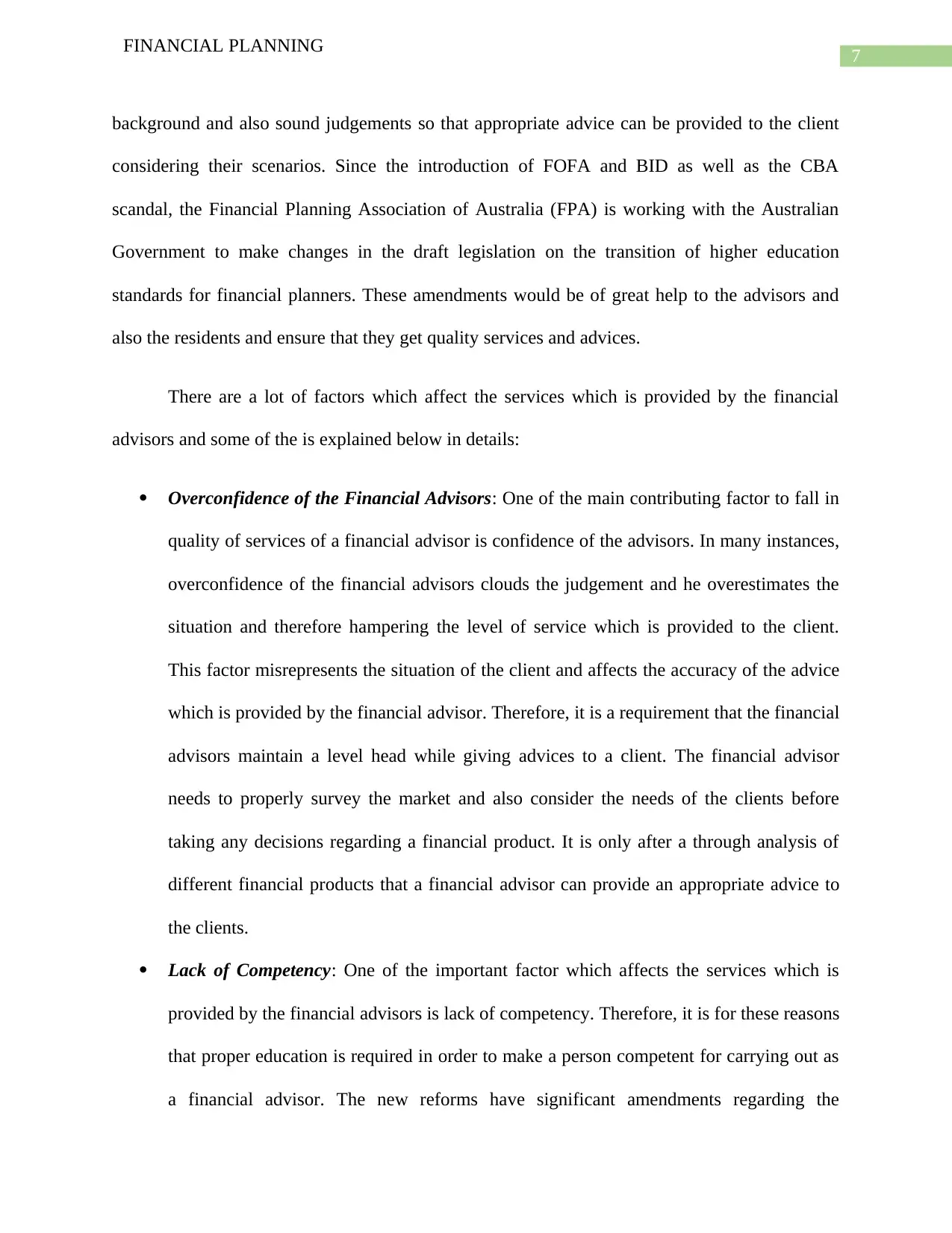
7
FINANCIAL PLANNING
background and also sound judgements so that appropriate advice can be provided to the client
considering their scenarios. Since the introduction of FOFA and BID as well as the CBA
scandal, the Financial Planning Association of Australia (FPA) is working with the Australian
Government to make changes in the draft legislation on the transition of higher education
standards for financial planners. These amendments would be of great help to the advisors and
also the residents and ensure that they get quality services and advices.
There are a lot of factors which affect the services which is provided by the financial
advisors and some of the is explained below in details:
Overconfidence of the Financial Advisors: One of the main contributing factor to fall in
quality of services of a financial advisor is confidence of the advisors. In many instances,
overconfidence of the financial advisors clouds the judgement and he overestimates the
situation and therefore hampering the level of service which is provided to the client.
This factor misrepresents the situation of the client and affects the accuracy of the advice
which is provided by the financial advisor. Therefore, it is a requirement that the financial
advisors maintain a level head while giving advices to a client. The financial advisor
needs to properly survey the market and also consider the needs of the clients before
taking any decisions regarding a financial product. It is only after a through analysis of
different financial products that a financial advisor can provide an appropriate advice to
the clients.
Lack of Competency: One of the important factor which affects the services which is
provided by the financial advisors is lack of competency. Therefore, it is for these reasons
that proper education is required in order to make a person competent for carrying out as
a financial advisor. The new reforms have significant amendments regarding the
FINANCIAL PLANNING
background and also sound judgements so that appropriate advice can be provided to the client
considering their scenarios. Since the introduction of FOFA and BID as well as the CBA
scandal, the Financial Planning Association of Australia (FPA) is working with the Australian
Government to make changes in the draft legislation on the transition of higher education
standards for financial planners. These amendments would be of great help to the advisors and
also the residents and ensure that they get quality services and advices.
There are a lot of factors which affect the services which is provided by the financial
advisors and some of the is explained below in details:
Overconfidence of the Financial Advisors: One of the main contributing factor to fall in
quality of services of a financial advisor is confidence of the advisors. In many instances,
overconfidence of the financial advisors clouds the judgement and he overestimates the
situation and therefore hampering the level of service which is provided to the client.
This factor misrepresents the situation of the client and affects the accuracy of the advice
which is provided by the financial advisor. Therefore, it is a requirement that the financial
advisors maintain a level head while giving advices to a client. The financial advisor
needs to properly survey the market and also consider the needs of the clients before
taking any decisions regarding a financial product. It is only after a through analysis of
different financial products that a financial advisor can provide an appropriate advice to
the clients.
Lack of Competency: One of the important factor which affects the services which is
provided by the financial advisors is lack of competency. Therefore, it is for these reasons
that proper education is required in order to make a person competent for carrying out as
a financial advisor. The new reforms have significant amendments regarding the
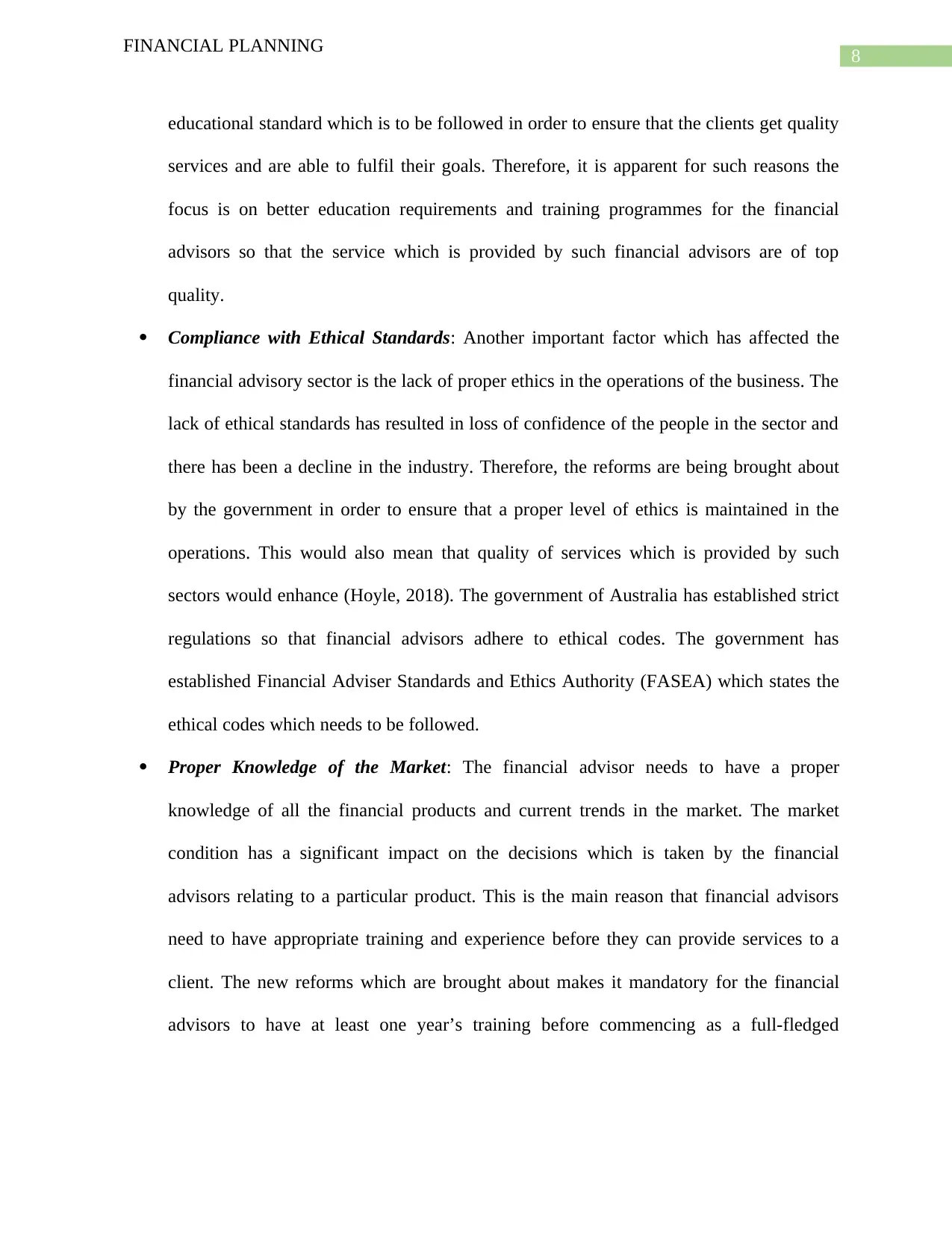
8
FINANCIAL PLANNING
educational standard which is to be followed in order to ensure that the clients get quality
services and are able to fulfil their goals. Therefore, it is apparent for such reasons the
focus is on better education requirements and training programmes for the financial
advisors so that the service which is provided by such financial advisors are of top
quality.
Compliance with Ethical Standards: Another important factor which has affected the
financial advisory sector is the lack of proper ethics in the operations of the business. The
lack of ethical standards has resulted in loss of confidence of the people in the sector and
there has been a decline in the industry. Therefore, the reforms are being brought about
by the government in order to ensure that a proper level of ethics is maintained in the
operations. This would also mean that quality of services which is provided by such
sectors would enhance (Hoyle, 2018). The government of Australia has established strict
regulations so that financial advisors adhere to ethical codes. The government has
established Financial Adviser Standards and Ethics Authority (FASEA) which states the
ethical codes which needs to be followed.
Proper Knowledge of the Market: The financial advisor needs to have a proper
knowledge of all the financial products and current trends in the market. The market
condition has a significant impact on the decisions which is taken by the financial
advisors relating to a particular product. This is the main reason that financial advisors
need to have appropriate training and experience before they can provide services to a
client. The new reforms which are brought about makes it mandatory for the financial
advisors to have at least one year’s training before commencing as a full-fledged
FINANCIAL PLANNING
educational standard which is to be followed in order to ensure that the clients get quality
services and are able to fulfil their goals. Therefore, it is apparent for such reasons the
focus is on better education requirements and training programmes for the financial
advisors so that the service which is provided by such financial advisors are of top
quality.
Compliance with Ethical Standards: Another important factor which has affected the
financial advisory sector is the lack of proper ethics in the operations of the business. The
lack of ethical standards has resulted in loss of confidence of the people in the sector and
there has been a decline in the industry. Therefore, the reforms are being brought about
by the government in order to ensure that a proper level of ethics is maintained in the
operations. This would also mean that quality of services which is provided by such
sectors would enhance (Hoyle, 2018). The government of Australia has established strict
regulations so that financial advisors adhere to ethical codes. The government has
established Financial Adviser Standards and Ethics Authority (FASEA) which states the
ethical codes which needs to be followed.
Proper Knowledge of the Market: The financial advisor needs to have a proper
knowledge of all the financial products and current trends in the market. The market
condition has a significant impact on the decisions which is taken by the financial
advisors relating to a particular product. This is the main reason that financial advisors
need to have appropriate training and experience before they can provide services to a
client. The new reforms which are brought about makes it mandatory for the financial
advisors to have at least one year’s training before commencing as a full-fledged
⊘ This is a preview!⊘
Do you want full access?
Subscribe today to unlock all pages.

Trusted by 1+ million students worldwide
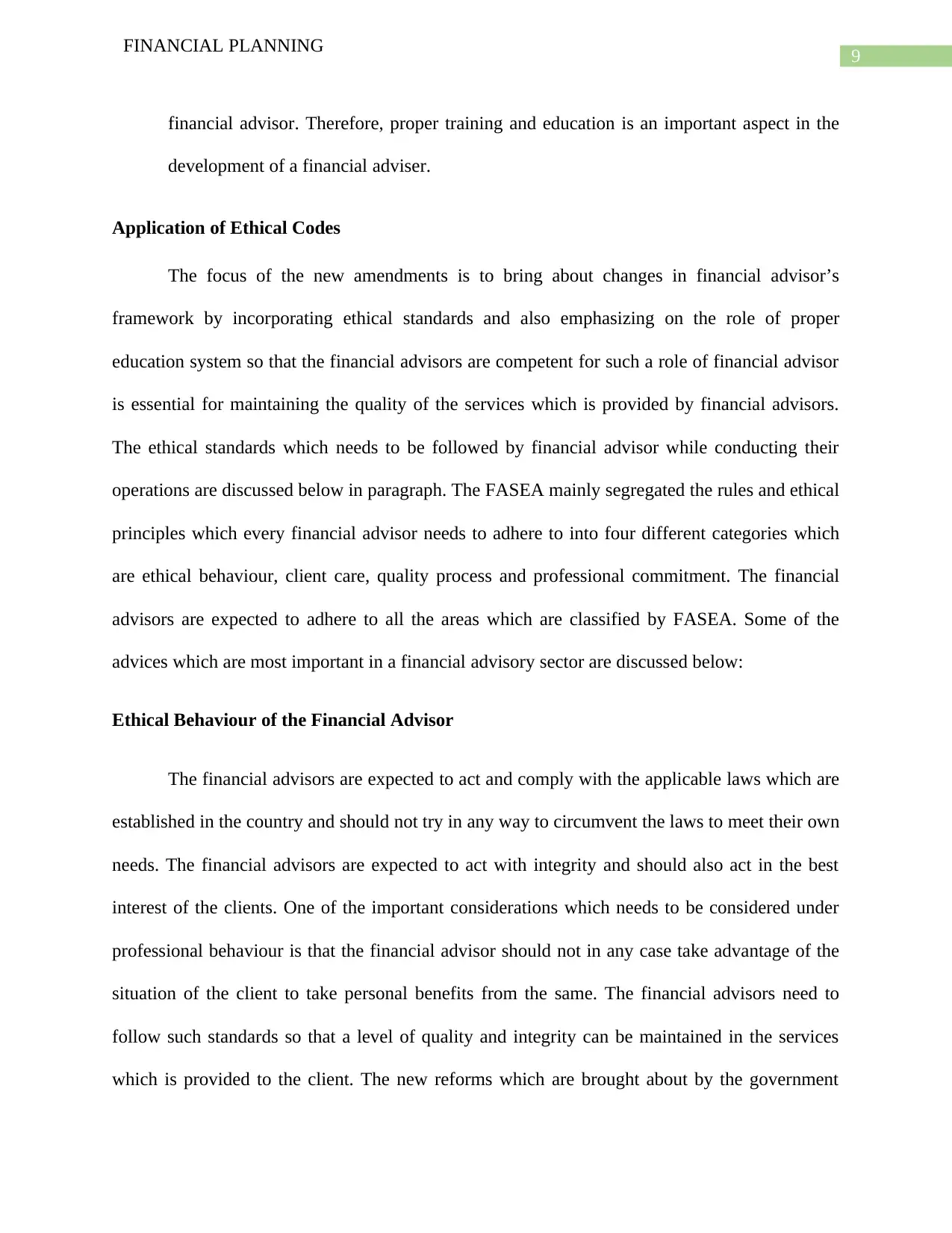
9
FINANCIAL PLANNING
financial advisor. Therefore, proper training and education is an important aspect in the
development of a financial adviser.
Application of Ethical Codes
The focus of the new amendments is to bring about changes in financial advisor’s
framework by incorporating ethical standards and also emphasizing on the role of proper
education system so that the financial advisors are competent for such a role of financial advisor
is essential for maintaining the quality of the services which is provided by financial advisors.
The ethical standards which needs to be followed by financial advisor while conducting their
operations are discussed below in paragraph. The FASEA mainly segregated the rules and ethical
principles which every financial advisor needs to adhere to into four different categories which
are ethical behaviour, client care, quality process and professional commitment. The financial
advisors are expected to adhere to all the areas which are classified by FASEA. Some of the
advices which are most important in a financial advisory sector are discussed below:
Ethical Behaviour of the Financial Advisor
The financial advisors are expected to act and comply with the applicable laws which are
established in the country and should not try in any way to circumvent the laws to meet their own
needs. The financial advisors are expected to act with integrity and should also act in the best
interest of the clients. One of the important considerations which needs to be considered under
professional behaviour is that the financial advisor should not in any case take advantage of the
situation of the client to take personal benefits from the same. The financial advisors need to
follow such standards so that a level of quality and integrity can be maintained in the services
which is provided to the client. The new reforms which are brought about by the government
FINANCIAL PLANNING
financial advisor. Therefore, proper training and education is an important aspect in the
development of a financial adviser.
Application of Ethical Codes
The focus of the new amendments is to bring about changes in financial advisor’s
framework by incorporating ethical standards and also emphasizing on the role of proper
education system so that the financial advisors are competent for such a role of financial advisor
is essential for maintaining the quality of the services which is provided by financial advisors.
The ethical standards which needs to be followed by financial advisor while conducting their
operations are discussed below in paragraph. The FASEA mainly segregated the rules and ethical
principles which every financial advisor needs to adhere to into four different categories which
are ethical behaviour, client care, quality process and professional commitment. The financial
advisors are expected to adhere to all the areas which are classified by FASEA. Some of the
advices which are most important in a financial advisory sector are discussed below:
Ethical Behaviour of the Financial Advisor
The financial advisors are expected to act and comply with the applicable laws which are
established in the country and should not try in any way to circumvent the laws to meet their own
needs. The financial advisors are expected to act with integrity and should also act in the best
interest of the clients. One of the important considerations which needs to be considered under
professional behaviour is that the financial advisor should not in any case take advantage of the
situation of the client to take personal benefits from the same. The financial advisors need to
follow such standards so that a level of quality and integrity can be maintained in the services
which is provided to the client. The new reforms which are brought about by the government
Paraphrase This Document
Need a fresh take? Get an instant paraphrase of this document with our AI Paraphraser
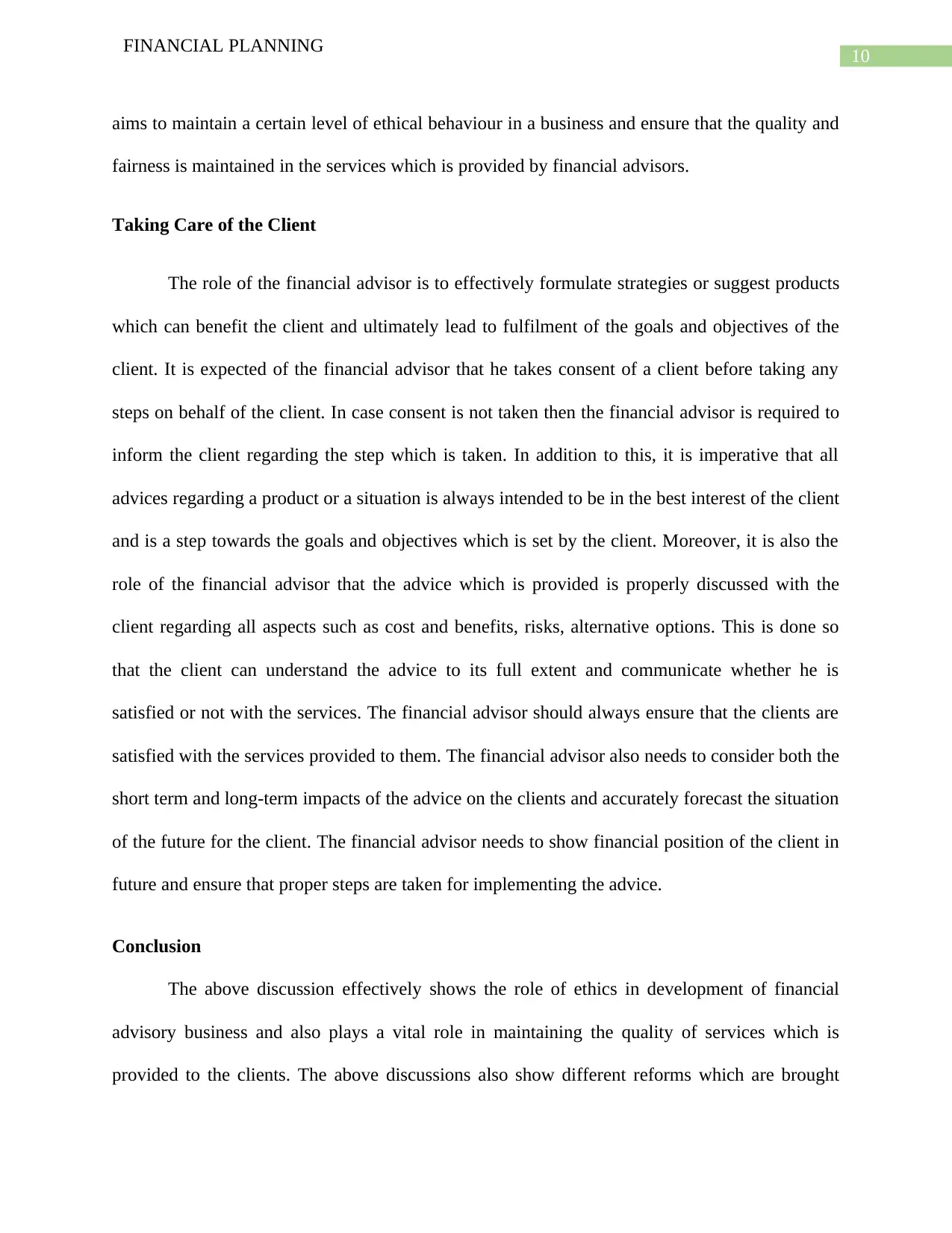
10
FINANCIAL PLANNING
aims to maintain a certain level of ethical behaviour in a business and ensure that the quality and
fairness is maintained in the services which is provided by financial advisors.
Taking Care of the Client
The role of the financial advisor is to effectively formulate strategies or suggest products
which can benefit the client and ultimately lead to fulfilment of the goals and objectives of the
client. It is expected of the financial advisor that he takes consent of a client before taking any
steps on behalf of the client. In case consent is not taken then the financial advisor is required to
inform the client regarding the step which is taken. In addition to this, it is imperative that all
advices regarding a product or a situation is always intended to be in the best interest of the client
and is a step towards the goals and objectives which is set by the client. Moreover, it is also the
role of the financial advisor that the advice which is provided is properly discussed with the
client regarding all aspects such as cost and benefits, risks, alternative options. This is done so
that the client can understand the advice to its full extent and communicate whether he is
satisfied or not with the services. The financial advisor should always ensure that the clients are
satisfied with the services provided to them. The financial advisor also needs to consider both the
short term and long-term impacts of the advice on the clients and accurately forecast the situation
of the future for the client. The financial advisor needs to show financial position of the client in
future and ensure that proper steps are taken for implementing the advice.
Conclusion
The above discussion effectively shows the role of ethics in development of financial
advisory business and also plays a vital role in maintaining the quality of services which is
provided to the clients. The above discussions also show different reforms which are brought
FINANCIAL PLANNING
aims to maintain a certain level of ethical behaviour in a business and ensure that the quality and
fairness is maintained in the services which is provided by financial advisors.
Taking Care of the Client
The role of the financial advisor is to effectively formulate strategies or suggest products
which can benefit the client and ultimately lead to fulfilment of the goals and objectives of the
client. It is expected of the financial advisor that he takes consent of a client before taking any
steps on behalf of the client. In case consent is not taken then the financial advisor is required to
inform the client regarding the step which is taken. In addition to this, it is imperative that all
advices regarding a product or a situation is always intended to be in the best interest of the client
and is a step towards the goals and objectives which is set by the client. Moreover, it is also the
role of the financial advisor that the advice which is provided is properly discussed with the
client regarding all aspects such as cost and benefits, risks, alternative options. This is done so
that the client can understand the advice to its full extent and communicate whether he is
satisfied or not with the services. The financial advisor should always ensure that the clients are
satisfied with the services provided to them. The financial advisor also needs to consider both the
short term and long-term impacts of the advice on the clients and accurately forecast the situation
of the future for the client. The financial advisor needs to show financial position of the client in
future and ensure that proper steps are taken for implementing the advice.
Conclusion
The above discussion effectively shows the role of ethics in development of financial
advisory business and also plays a vital role in maintaining the quality of services which is
provided to the clients. The above discussions also show different reforms which are brought
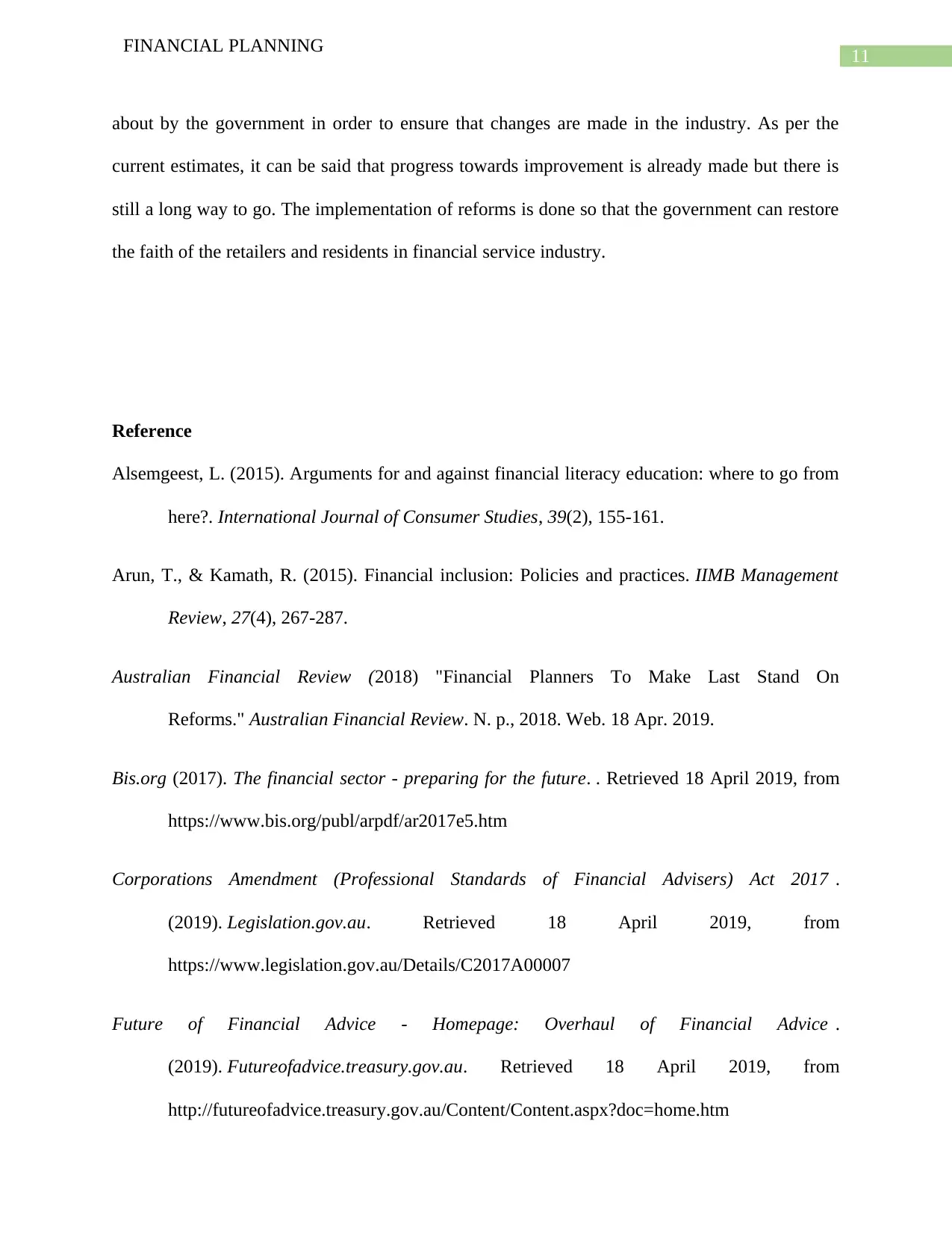
11
FINANCIAL PLANNING
about by the government in order to ensure that changes are made in the industry. As per the
current estimates, it can be said that progress towards improvement is already made but there is
still a long way to go. The implementation of reforms is done so that the government can restore
the faith of the retailers and residents in financial service industry.
Reference
Alsemgeest, L. (2015). Arguments for and against financial literacy education: where to go from
here?. International Journal of Consumer Studies, 39(2), 155-161.
Arun, T., & Kamath, R. (2015). Financial inclusion: Policies and practices. IIMB Management
Review, 27(4), 267-287.
Australian Financial Review (2018) "Financial Planners To Make Last Stand On
Reforms." Australian Financial Review. N. p., 2018. Web. 18 Apr. 2019.
Bis.org (2017). The financial sector - preparing for the future. . Retrieved 18 April 2019, from
https://www.bis.org/publ/arpdf/ar2017e5.htm
Corporations Amendment (Professional Standards of Financial Advisers) Act 2017 .
(2019). Legislation.gov.au. Retrieved 18 April 2019, from
https://www.legislation.gov.au/Details/C2017A00007
Future of Financial Advice - Homepage: Overhaul of Financial Advice .
(2019). Futureofadvice.treasury.gov.au. Retrieved 18 April 2019, from
http://futureofadvice.treasury.gov.au/Content/Content.aspx?doc=home.htm
FINANCIAL PLANNING
about by the government in order to ensure that changes are made in the industry. As per the
current estimates, it can be said that progress towards improvement is already made but there is
still a long way to go. The implementation of reforms is done so that the government can restore
the faith of the retailers and residents in financial service industry.
Reference
Alsemgeest, L. (2015). Arguments for and against financial literacy education: where to go from
here?. International Journal of Consumer Studies, 39(2), 155-161.
Arun, T., & Kamath, R. (2015). Financial inclusion: Policies and practices. IIMB Management
Review, 27(4), 267-287.
Australian Financial Review (2018) "Financial Planners To Make Last Stand On
Reforms." Australian Financial Review. N. p., 2018. Web. 18 Apr. 2019.
Bis.org (2017). The financial sector - preparing for the future. . Retrieved 18 April 2019, from
https://www.bis.org/publ/arpdf/ar2017e5.htm
Corporations Amendment (Professional Standards of Financial Advisers) Act 2017 .
(2019). Legislation.gov.au. Retrieved 18 April 2019, from
https://www.legislation.gov.au/Details/C2017A00007
Future of Financial Advice - Homepage: Overhaul of Financial Advice .
(2019). Futureofadvice.treasury.gov.au. Retrieved 18 April 2019, from
http://futureofadvice.treasury.gov.au/Content/Content.aspx?doc=home.htm
⊘ This is a preview!⊘
Do you want full access?
Subscribe today to unlock all pages.

Trusted by 1+ million students worldwide
1 out of 14
Related Documents
Your All-in-One AI-Powered Toolkit for Academic Success.
+13062052269
info@desklib.com
Available 24*7 on WhatsApp / Email
![[object Object]](/_next/static/media/star-bottom.7253800d.svg)
Unlock your academic potential
Copyright © 2020–2026 A2Z Services. All Rights Reserved. Developed and managed by ZUCOL.





